Advertisement
The WBUR Pie Fest
How 'Pie Vibes' — And A Pie Fest — Can Unify In Tumultuous Times
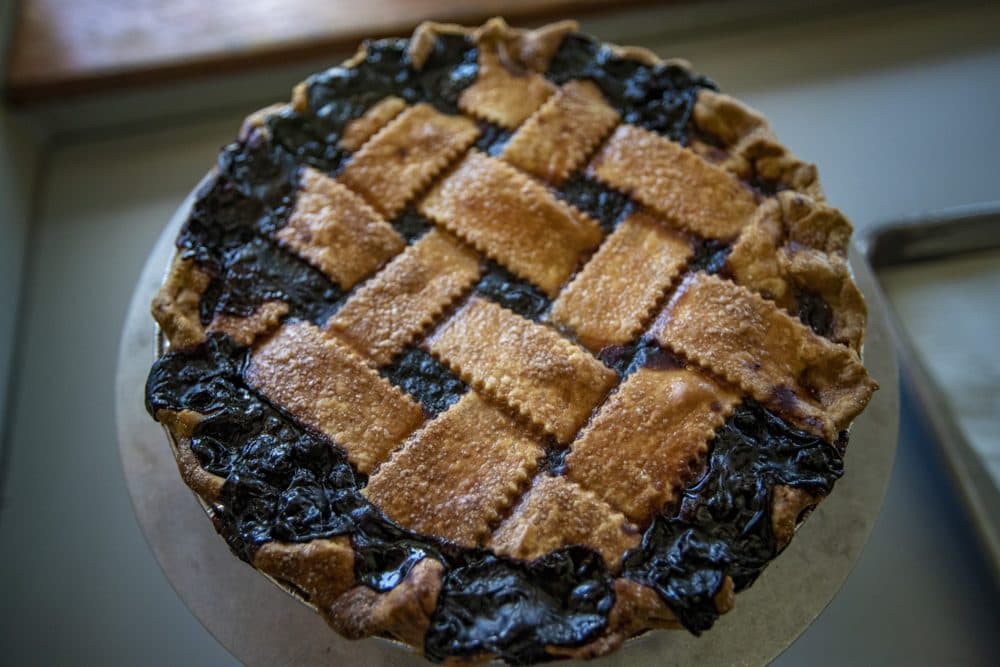
With our country so fractured we've been thinking about ways to come together — and the WBUR Pie Fest was born. We're celebrating this versatile pastry's past and present, and we hope you'll join us by sharing recipes and photos of your favorites. The ARTery is also hosting a live, online cooking class Thursday, Sept. 10.
To kick off the homage to pie, we reached out to some experts in crust, filling and pie vibes. We of course had to pay a visit to Petsi Pies in Somerville.
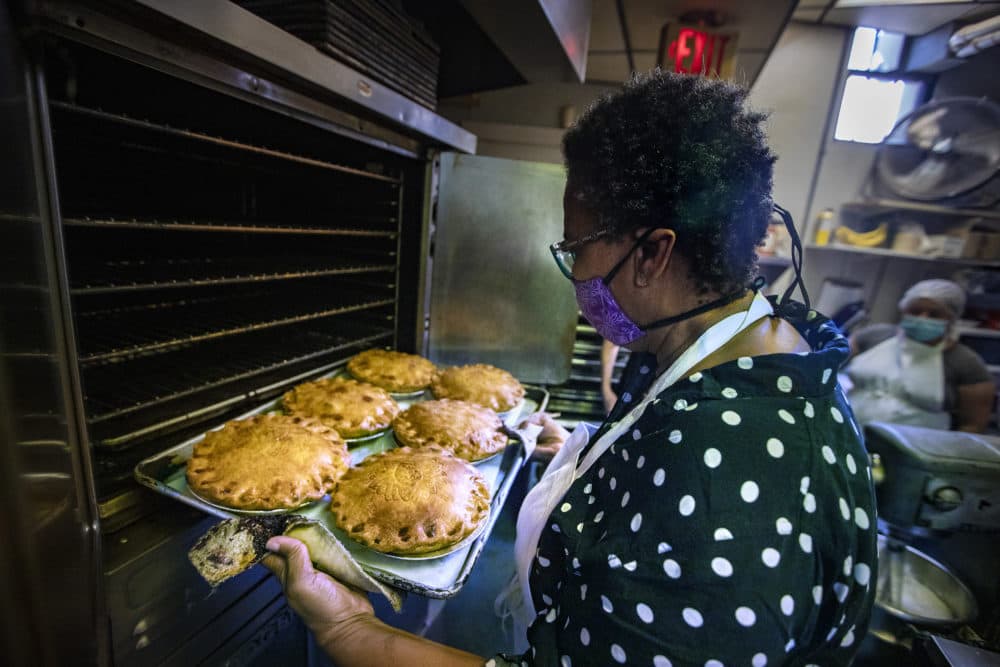
Renee McLeod's passions erupted when she opened an oven in her bakery's kitchen. “Woo hoo!” she exclaimed while pulling out a large tray laden with pie tins of chocolate crusts for her decadent Mississippi Mud Pies. After they cooled McLeod loaded them with a brownie and ganache mixture, then topped the mound with even more luscious, whipped chocolate.
The aroma was intoxicating. And comforting.
Pie Brings Us Together
McLeod founded Petsi Pies in 2003. Now she estimates her staff bakes more than 35,000 pies each year.
“I opened because I thought pie brings people together,” the life-long pie maven said. She also believed she could save the world with pie.
“I really thought that I had this, like, magic formula,” McLeod mused, “you give someone something delicious — sweet or savory — and communication happens.”
And it's worked. McLeod recounted lighting up countless smiles in the early days of her shop when she baked too many pies and gave away the extras to people passing by in their cars.
“That's what I wanted,” she said, “And I wanted to get to know who's driving around and walking around.”
Pie even healed a broken relationship between a mother and her daughter who was one of McLeod's customers.
Advertisement
“She brought her a pie, and it was something that they used to make together, and they started talking — talking pie,” McLeod remembered, smiling, “and now she's got a mom back, and mom's got a daughter back.”
Pie Bridges Generations
McLeod holds a lifetime of pie stories close. Her's began with her grandmother in Ozark, Alabama who taught her to make sweet potato pie without a recipe — because there wasn't one.
“She just taught me to taste the mixture and trust it, and I just practiced until mine was almost as good as hers,” McLeod said. Now a savory, brown butter sweet potato pie loaded with pecans is one of Petsi Pies' signature offerings.
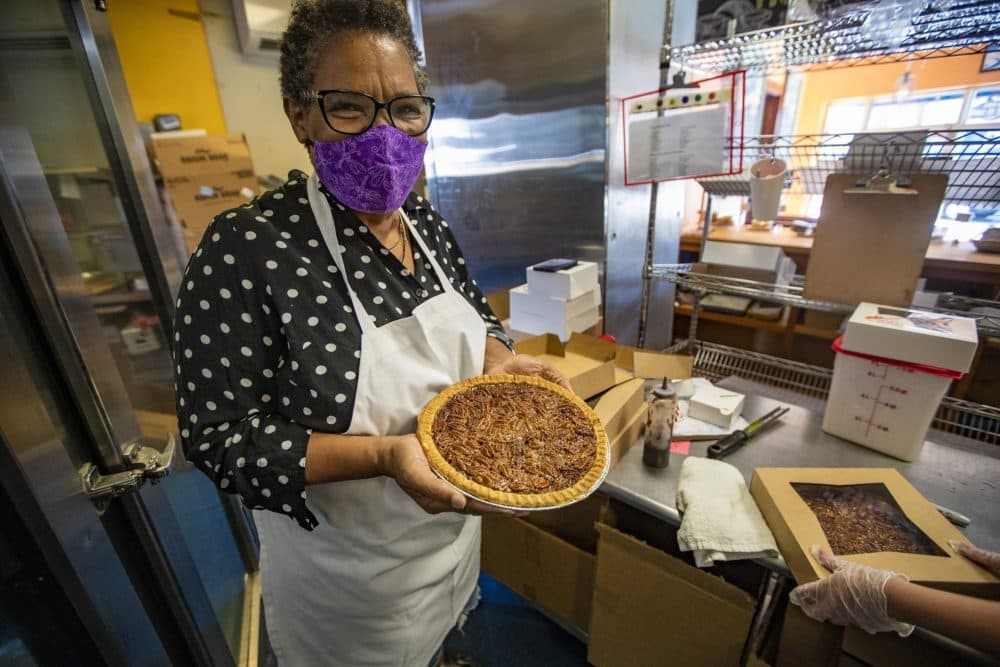
McLeod began to understand pie's power as a middle schooler in Providence. A soda fountain owner there would give her slivers of lemon meringue because, she recalls, she couldn't afford a slice.
“He was really nice. And his wife made pies. And I came in and ate pies and got to know him,” McLeod explained. “I learned a lot of what I know about Jewish culture and the Holocaust from this man. I had no idea what had happened until this nice man at the soda fountain. And we used to talk every afternoon.”
Pie As A Game-Changer
Elle Simone Scott calls pie a game-changer. “I don't know anyone who's not happy when they're eating pie,” she said, “I don't.”
Scott is executive editor and inclusion leader at America's Test Kitchen in Boston. She's also the first Black woman to be cast for its on-air broadcasts.
“When I think of pie I think of the South, like down home, sitting in the window sill cooling, the smell of apples wafting,” she said.
For Scott, pie also evokes the women in friendly baking competition at church events, holidays with her family, and moments where we feel loved and accepted for who we are.
“I think people associate most food with memory,” she said, “and it's like music. We smell something and it triggers a moment or an emotion, you know?”
Pie is personal, Scott added, and right now she thinks it can cross culture and creed because so many regions and ethnicities embrace their own pie traditions.
“Pulling pie into the conversation is a really stark reminder that we share more in common culturally than not, because — if nothing — food teaches us that we're more unified and more alike than we'd like to admit sometimes,” she said.
But pies, and especially pie crust, can be intimidating. That's why Scott loves a big apple slab pie that's made in a sheet pan and can be shared with friends in parks and on porches.
“Anyone can do it, it's very simple to execute, and it still looks gorgeous,” she said, adding my new favorite phrase, “it still gives you pie vibes."
More Pie Vibes
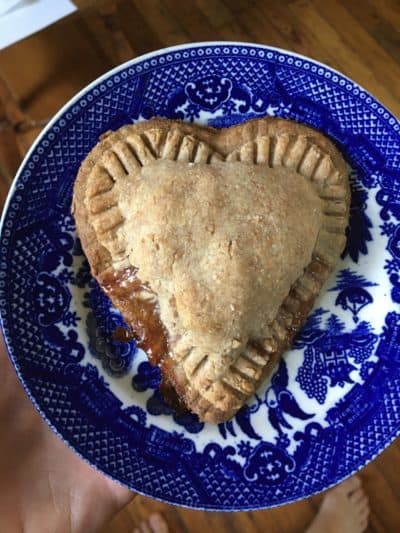
These days Amy Halloran is embracing hand pie vibes. She's an avid baker and author of the book “The New Bread Basket.” One of her favorite pie memories is when a friend volunteered on Thanksgiving at the food pantry Halloran was running.
“And we made 150 sweet potato hand pies,” she recalled, “because we wanted to give people something to take home.”
Halloran sees hand pies as little edible gifts that can even be shaped into flaky hearts. But throughout history, they've also served as portable food packages for the working class. She points to pasties from Upper Michigan.
“They are this meat and turnip pie in a very Crisco lard crust,” Halloran explained, “And this is something that came over from the English tradition of miners. You know, you take this food with you to the depths and you can hold it and have your meal without a fork.”
Pie And Class And Pie-Haters
Talking about pie also brings up a host of class rifts and issues, according to Plymouth-based culinary historian Paula Marcoux.
“For hundreds of years pie was something that more upper-class people had access to,” she explained. Pies weren't for servants and enslaved persons — unless they were able to scavenge the remaining pieces of crust when they came back to the kitchen.
Marcoux said barriers, including the cost of ingredients, were lowered in the 19th century and in New England pie was eaten morning, noon and night. She wrote the book “Cooking with Fire” and replicates period pastry recipes in an antique cast iron oven. For her, baking like this creates a portal to America's pie-eating past.
"To me, it feels like a very 19th-century type of joy to open that door up and see pumpkin pies and apple pies and mince pies and Marlboro pies, and maybe a coconut pie or a lemon pie," Marcoux said.
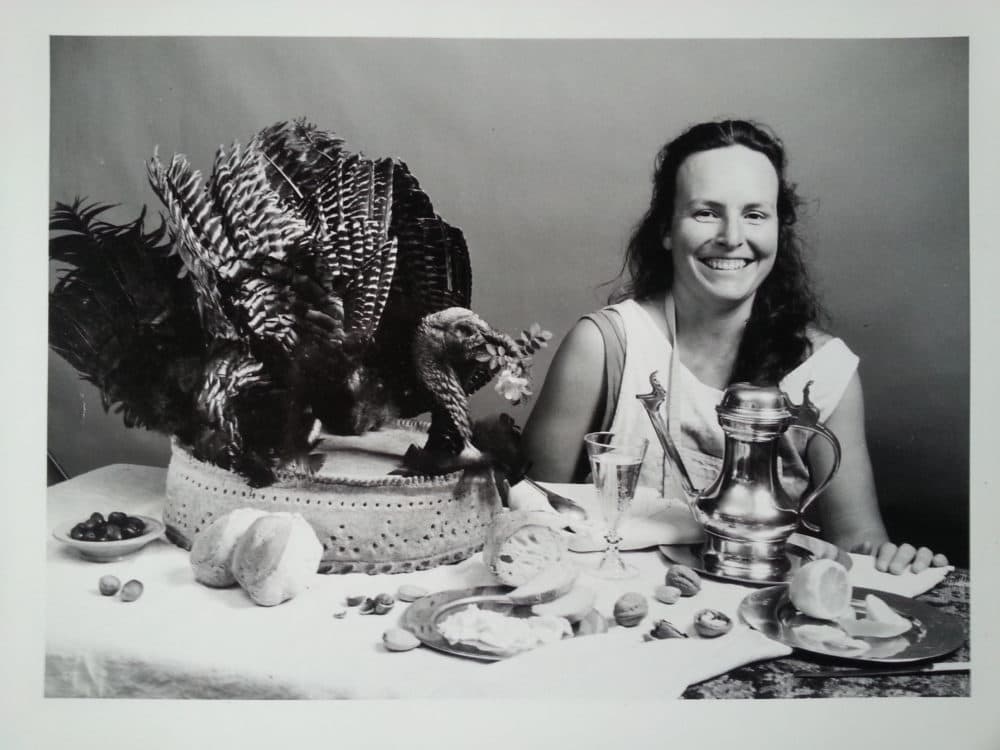
But pie wasn't always beloved. New Englanders also looked down on pie in the mid-1800s.
“People ate more pies then than probably ever in the world since or before,” Marcoux said. “But there was so much ink spilled about how they were the world's most destructive food, the least wholesome, and just if you wanted to kill yourself you should eat pies.”
Throughout the pandemic, she's been making homey Quahog pie to eat together with her pod. When asked to describe it, Marcoux told me to imagine old-school clam chowder with salt pork and potatoes wrapped in a huge crust. "Even as leftovers it's terrific," she added.
People Talking — Or Not — Over Pie
In a tumultuous 2020, Marcoux wishes pie had the power to get people talking and listening more productively. "If there is some way to open up the clogged channels of communication and just seeing each other's humanity — if pies could help in any way, I'd be making pastry for that right now," she said.
Renee McLeod of Petsi Pies feels the same way about the divisive political climate we're in.
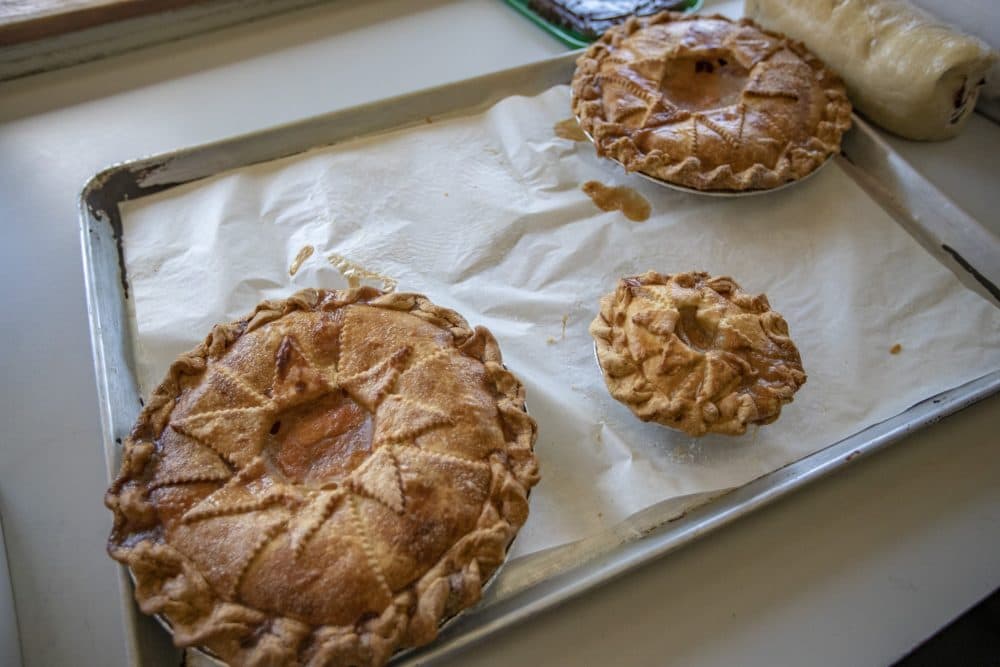
“It seems like we're going to need a lot of pie!” she said with a laugh. Then McLeod fantasized about going on a pie listening tour and baking a gigantic pie for our times.
But of course, pie isn't a perfect panacea. People have impassioned opinions and feelings about pie origins, names and ingredients. The pie versus cobbler and butter versus shortening crust debates have long been heated.
"Key Lime belongs to Florida, cherries have to be from Michigan, pecans have to be from Georgia," McLeod said. "But other than that, everybody can agree that it's delicious."
And she believes — right now — we could all use a fresh, warm slice.
You can share your pie vibes — along with recipes and photos — during this week's WBUR Pie Fest. Andrea Shea will host a conversation and bake a slab pie with Elle Simon of America's Test Kitchen on Thursday, Sept. 10 at 5 p.m.
This segment aired on September 8, 2020.
